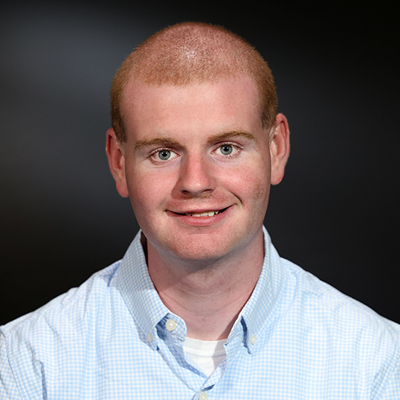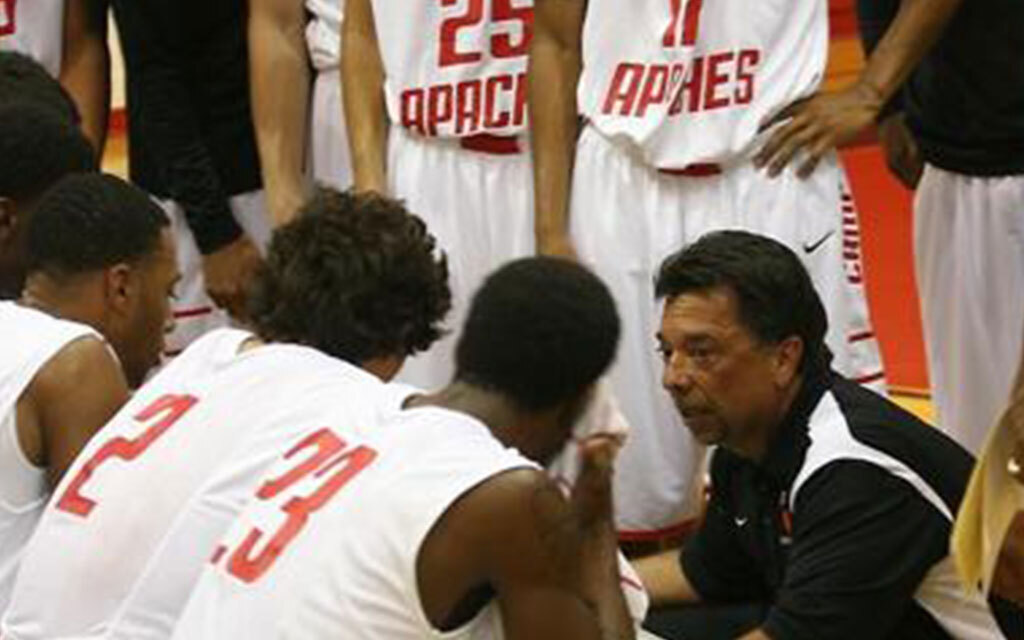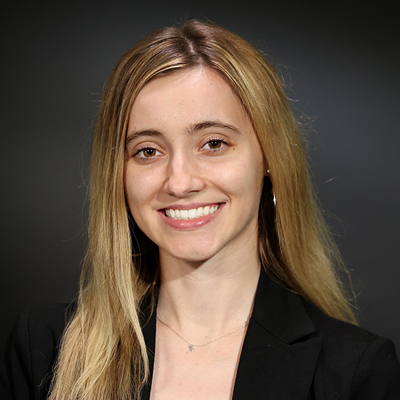DOUGLAS – Oscar Cluff had no idea what to expect when he arrived at Cochise College for the first time in August 2021.
Unlike many recruits, he didn’t visit the campus before committing because of the COVID-19 pandemic. Everything about Cochise College was unknown for the 6-foot-10 center from Sunshine Coast, Australia, but since it was his only solid offer to play college basketball in United States, it was an opportunity.
Including layovers, after a 31-hour flight from Brisbane, Australia, to Tucson, he was picked up and driven to campus for the first time.
The campus is located almost halfway between Bisbee and Douglas on Interstate 80 in Southeastern Arizona. It sits at the halfway point of an eight-mile stretch of straight-away road with no traffic signals, gas stations or convenience stores. Empty, sun-gazed farmland is on either side of the interstate, with views of a Mexican mountain range in the distance.
But yet, despite all its emptiness, the gold standard of junior college basketball in Arizona resides off this road. The same road was traveled by hundreds of former players who moved on to play at four-year programs.
“I’d probably be playing in the NBL 1 back home (if it wasn’t for Cochise),” Cluff said about the semi-pro Australian League. “But it’s nothing like what’s in the (United) States at all.”
Two years, 846 points, 589 rebounds and 58 wins later, Cluff transformed his opportunity into a Cochise success story and will play basketball at Washington State in the 2023-24 season.
It’s success stories like Cluff’s that keep Cochise men’s basketball coach Jerry Carrillo going as he approaches his 29th season.
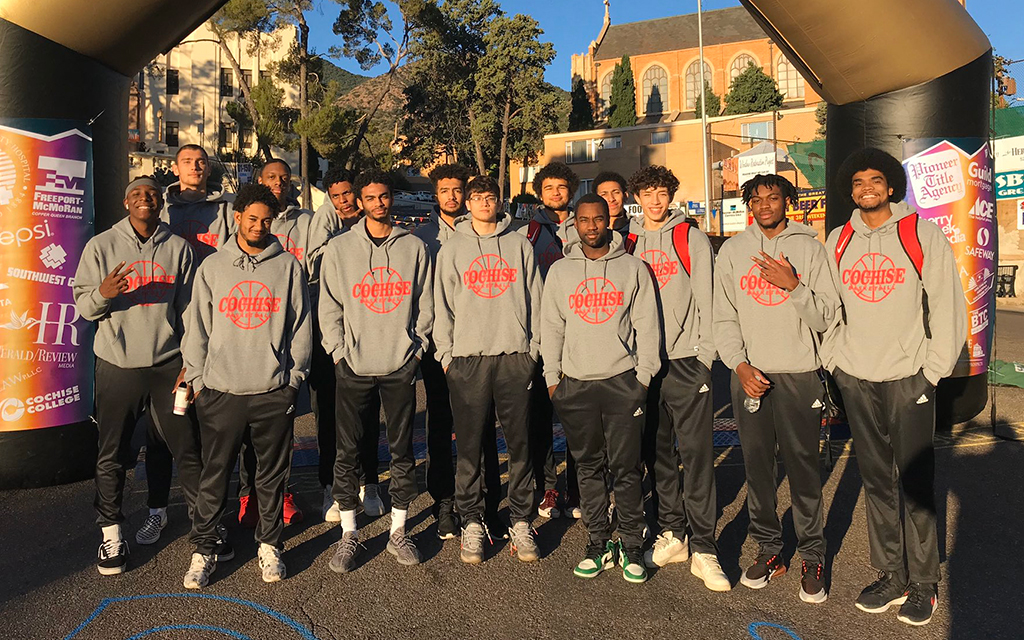
The 2019-20 Cochise men’s basketball team volunteered at the Bisbee 1000 Stair Climb in October 2019 as part of the program’s tradition. The team’s support is reciprocated at its home games. (Photo courtesy of Cochise College Athletics)
Carrillo’s Career
Carrillo grew up across the street from Salpointe Catholic High School in Tucson, before earning All-City honors as a player for the Lancers in 1982. He graduated from the University of Arizona in 1987 with a bachelor’s degree in physical education before getting his master’s degree in kinesiology at California State Northridge.
Shortly after, he was an assistant at Jamestown Community College in New York before returning to Cal State Northridge as an assistant for two years.
Carrillo served as the second assistant on staff during the program’s transition from NCAA Division II to Division I. He recruited California junior college players, where he learned the art of college basketball recruiting.
“There were some really great junior college players,” Carrillo said. “I recruited (former first-round pick) Corie Blount at Rancho Santiago before he went to play at the University of Cincinnati.”
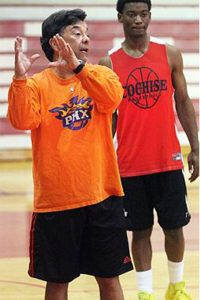
Cochise men’s basketball coach Jerry Carrillo played high school basketball at Salpointe Catholic, where he earned All-City honors in 1982. (Photo courtesy of Cochise College Athletics)
By 1992, Carrillo returned to Arizona as the boys basketball coach at Buena High School. When the Cochise College men’s basketball head coaching position opened in 1995, he was among a talented pool of candidates for the job. Shortly before school began, longtime athletic director Bo Hall offered him the position.
“When I applied for this job, I talked to some Division I guys that said, ‘Jerry, don’t take that job, no one’s ever won,’” Carrillo recalled. “So them telling me not to take it made me want to take it, and it’s been great in that regard ever since.”
Cochise College had just one season with at least 20 wins in the program’s 31-year history before Carrillo was hired. Additionally, Douglas, a border community of 16,000 with military and mining roots, was not known as a recruiting hotbed.
Since taking over in 1995, Carrillo has led the Apaches to an average of 22 wins per season to compile 629 wins in 28 years. On May 19, he was inducted into the NJCAA Men’s Basketball Coaches Association Hall of Fame.
The Start of Something Special
The first few years of his coaching career saw familiar faces. Three of the sophomores on the 1995-96 team were young men Carrillo had coached at Sierra Vista High School just a few years prior.
But as a young coach in his early 30s, Carrillo had visions of expanding his recruiting horizons. Cochise had a reciprocal agreement that allowed students from New Mexico to attend at a lower cost. He tirelessly recruited to get the most talented kids from the neighboring state from Hobbs to Farmington to Albuquerque, he managed to expand his recruiting sphere and build a foundation for success for many years to come.
“I worked really hard in getting the best players from the state of New Mexico to come our way,” he said. “A few years down the line, it really really worked out. We pieced that together with some kids from Sierra Vista and Tucson. But I think us getting into Albuquerque, the state of New Mexico, at that time was really good. We got the best players and we got them to come here, and we got them to move on.”
By the time he led Cochise to its first Region 1 Championship in 2000, he had helped nine players move on to play at four-year universities in New Mexico. Since that championship season, Carrillo has led the Apaches to six more regional titles, including two in the last three seasons.
As the wins came to Cochise, so did players from around the world. Carrillo recruited his way into Texas, securing the commitments of several El Paso High School Player of the Year winners over time.
In the last two years alone, players from Jamaica, Japan and Australia have donned the black and red. For next season, the Apaches have already secured a commitment from a 6-foot-9 Lithuanian forward Gytis Auruskevicius.
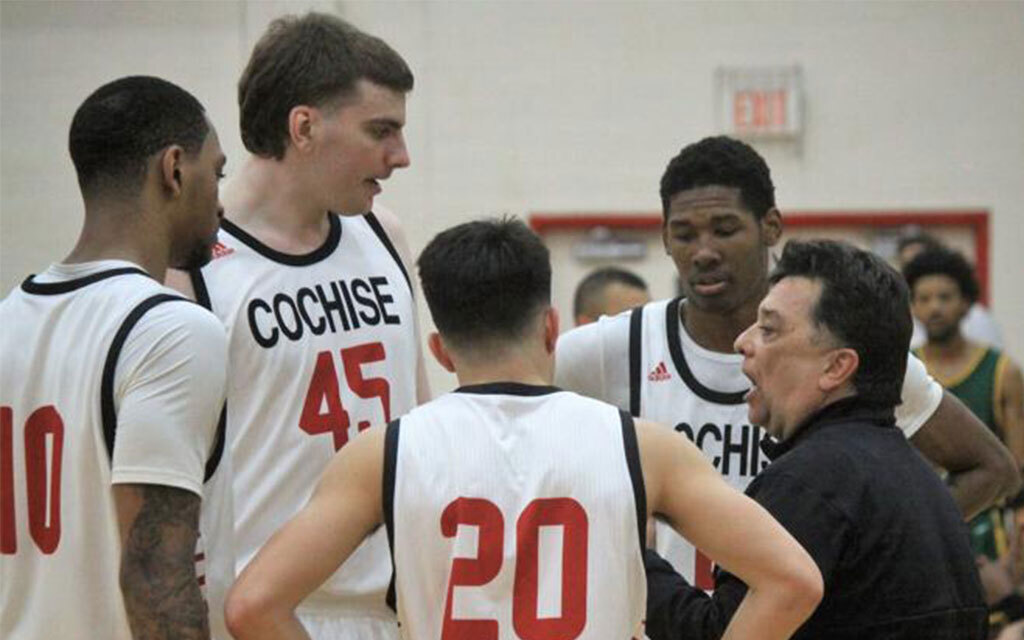
Cochise men’s basketball coach Jerry Carrillo started building his program into a powerhouse by recruiting students from New Mexico. Now international players seek out Cochise as a destination school for junior colleges. (Photo courtesy of Cochise College Athletics)
Third time is the charm
Out of the 112 players Carrillo has helped move on to play at four-year universities, eight have gone on to coach at the high school and collegiate levels. One is Derek Lane.
Lane, a Buena High School graduate, was a captain on the team’s 2009 run to the Arizona Interscholastic Association 5A Division I State Basketball Final Four. He played two seasons under Carrillo at Cochise after graduating high school.
He was named an assistant coach for the Apaches on three separate occasions – first, in 2016, the second time in 2020 and the third time on June 14. He left the program because his wife was on active duty. She was stationed in Fairbanks, Alaska, causing Lane to leave the program for the first time.
Lane’s wife was stationed at Fort Bliss in El Paso, Texas, when Carrillo needed an assistant coach in late-2020. It was a relatively easy commute for him, and he was close enough to El Paso in case something happened.
With his wife’s military career close to finished and an assistant coach position open, the time was right for Lane to come back to Cochise as an assistant for the third time.
“I love being a coach,” Lane said. “I love coaching basketball, It’s hard to say why I keep going back. It’s just something about Coach (Carrillo), something about the culture that he’s built, and being able to affect these young men’s life is just something that I’m grateful to be able to be a part of.”
Lane is more than just a typical assistant coach; he’s an example of someone who ate in the same cafeteria and slept in the same dorms. Carrillo is grateful for him to be back to continue building the culture that has been established.
“To be an assistant coach and tell these guys, ‘Hey, man, I did the same thing you did at the cafeteria. You know, I went to the weight room at six in the morning. I was on those long bus trips,’” he added. “It’s enabled us to have that quality of a culture.”

The Best of the Best
There are 10 men’s basketball programs that have remained in the Arizona Community College Athletic Conference (ACCAC) since the start of the 2015-16 season. Cochise’s dominance during that span has been unparalleled.
If each of the 10 ACCAC members went undefeated in 18 conference games in each of the next two seasons (36-0), and Cochise lost all those games, the Apaches would still have more wins than eight of those programs since 2015-16.
In your face and pushing the pace
Carrillo adopted his offensive philosophy from former NBA and NCAA coach Paul Westhead. Push the pace to get a shot before the defense gets set and press before the opponent’s offense can get started.
“Our main statistical analysis that we look at at halftime are two things: How many possessions do we have, and what’s our opponent’s field goal percentage defense?” he said. “We’re trying to get 50 or more possessions at half, and we want to play defense to try and score, not give up layups and dunks and sprint back.”
Cochise had the highest field goal percentage (54.9%) among the 427 NJCAA teams across all three levels of competition last season. The Apaches are also one of just seven junior college teams in the country to shoot at least 50% or better in each of the last two seasons.
Before media timeouts were implemented at the junior college level, the goal was to wear teams down. Increasing the number of offensive possessions and dictating the pace of play was a recipe for sustainable success and helped Cochise become one of the most efficient offensive teams in the country.
The Apache style of play isn’t just a philosophy that helps win games. It’s a style of play that helps players get recruited to play at the highest collegiate level at a four-year university.
“Part of the reason you go to junior college is to get re-recruited,” Carrillo said. “Part of the recruiting process for us is saying, ‘Hey, guys, we’re going to commit to playing fast, we want a lot of possessions.’ If you get a lot of possessions, you’re going to have the opportunity to showcase your game because there’s going to be more possessions in the game than a slower-paced game.”
For the long-term vision, the goal was a success – 112 players have moved on to play at four-year universities under Carrillo’s leadership.
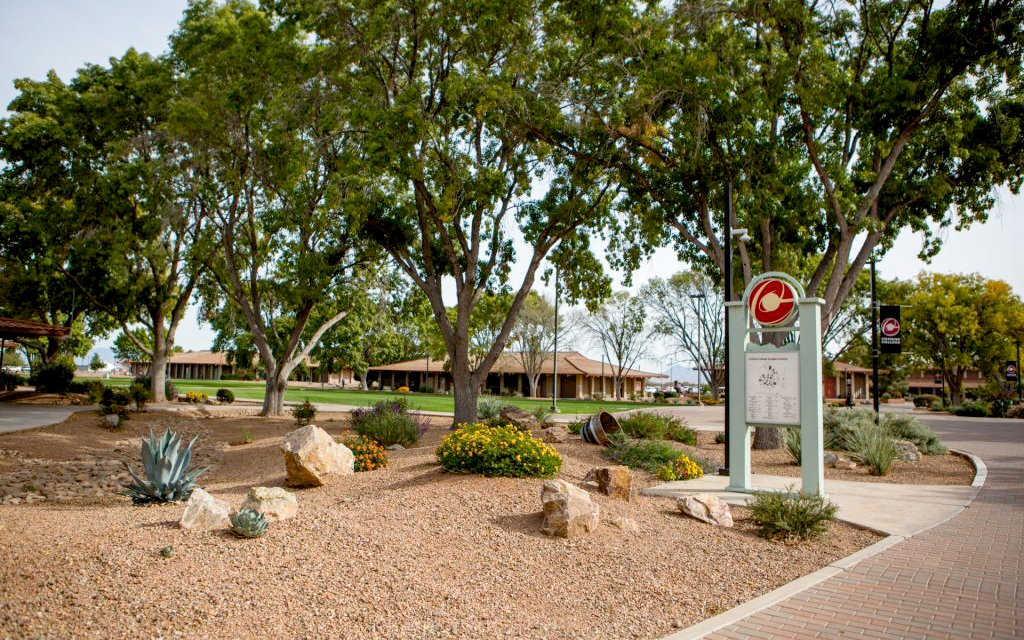
Cochise College has two campuses. One is in Sierra Vista and the other in Douglas, which houses the basketball program. (Photo courtesy of Cochise College)
Strength in the Stronghold
It’s important to the program to support nearby communities such as Bisbee, Douglas and Sierra Vista. Each year, the players go to the Bisbee 1000 Stair Climb, an annual race held in October, to set up and tear down the event and pass out water to the runners.
In addition to volunteering at the Bisbee 1000 Stair Climb, the program goes to local schools to read to kids several times throughout the year and hosts basketball clinics.
In turn, the communities come out to the Cochise gymnasium – dubbed as “The Stronghold” – and create a hostile environment for opponents. The formula works. The Apaches are 35-5 at home in the last three seasons.
“We have a great fanbase,” Carrillo said. “Saturday night in The Stronghold is a wild scene. We don’t charge admission. We get great, great support and the community has been great to us.”
The Future
Whenever Carrillo decides to conclude his legendary career as one of the best Arizona junior college coaches to live, the hope is that the program continues to grow on the foundation he built.
Lane, one of the most loyal people in his circle, hopes to be the one to continue to grow the dynasty Carrillo has built.
“I’d be honored whenever he decides to hang up the whistle to be able to take over the program,” he said. “Hopefully I’ve learned enough from him and enough from various coaches that I can hopefully step in and take over what he’s built and keep it going.”
But for now, the immediate future looks strong for the Apaches. The 2023 recruiting class has already gotten off to an encouraging start despite losing its top two scorers to Division I programs. In addition to Auruskevicius, the program added Ohio guard Joshua Whiteside and Texas guard Blake Courtney Jr.
As he walks through The Stronghold in the middle of June, Carrillo looks up at the 2021-22 and 2022-23 ACCAC banners and smiles. He wishes it was August. He’s eager and ready to begin his 29th season and win his third consecutive conference championship and make a push toward a national championship using his own blueprint.
“Cochise is not for everyone,” he added. “If you need a city and you need a lot of action, you need a lot of stuff, we’re honest, we tell them don’t come … We get guys through. We’re not a player factory; we’re not a player mill. We produce student-athletes.”
